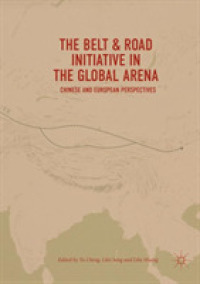- ホーム
- > 洋書
- > 英文書
- > Philosophy
Full Description
Examines how Montesquieu, Hume, Smith, and Ferguson's foundational liberal theories responded to the moral and civic challenges of early capitalism
Brings together discussions of key Enlightenment thinkers Montesquieu, David Hume, Adam Smith, and Adam Ferguson
Recaptures a conceptual space in the famous eighteenth-century commerce and virtue debates, which illustrates the possibility that one may accept the general principles of modernity while maintaining a healthy skepticism towards commerce
Compares how Montesquieu and key thinkers of the Scottish Enlightenment developed their distinct theories of honour in the context of eighteenth-century high finance, namely, in response to the infamous collapse of the Mississippi and South Sea 'bubbles' (1720)
Provides a heuristic device for identifying when commercial innovation poses a threat to liberal societies, and a framework for balancing commercial ends with the public good under conditions of liberal democracy
Expands the currency of ideas available in foundational liberal thought for identifying an emotional quality that is necessary for twentyfirst-century citizenship
Montesquieu's Moderate Liberalism and the Scottish Enlightenment responds to a perennial problem in political theory: how to balance commercial considerations with the public good. It investigates this dilemma through the lenses of Enlightenment thinkers whose liberal theories responded to the hazards of commercial innovation during capitalism's nascent stages. Vassiliou argues that Montesquieu, David Hume, Adam Smith, and Adam Ferguson represent a moderate perspective in foundational liberal thought, which emphasizes the critical importance of honour. He compares how their liberal theories uniquely channel human beings' desire for honour to nourish a sense of interpersonal magnanimity within an inward-looking, liberal commercial world. In an age of polarized extremes, we have witnessed restive democracies flirting with populist, illiberal responses for managing the hazards of capitalist innovation. Montesquieu and his Scottish counterparts' foundational liberal theories offer us more viable, middle-ground prescriptions which are sensitive to the emotional constitution of a liberal society.
Contents
Acknowledgements
Preface A Liberal Framework for Inspiring Magnanimity in the Modern Commercial World
Introduction Montesquieu's Moderate Liberalism and the Scottish Enlightenment
Chapter 1. From High Society to High Finance: 'John Law's System and the Spectre of Modern Despotism'
Chapter 2. 'Real Wealth' vs. 'Fictional Wealth' in an Age of High Finance: Montesquieu, Hume and Smith
Chapter 3. 'Ancient Prudence' Vs. 'Modern Prudence': Montesquieu's Response to James Harrington
Chapter 4. Montesquieu and Hume's English and French Affinities
Chapter 5. Liberty and Honour in Britain and France
Chapter 6. Montesquieu's Honour
Chapter 7. A Liberal Art for the Commercial World: Adam Smith and Adam Ferguson
Conclusion Moderate Liberalism for a Commercial World in Transition
Bibliography








